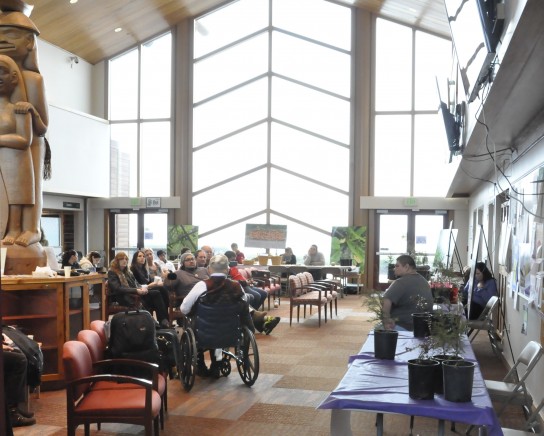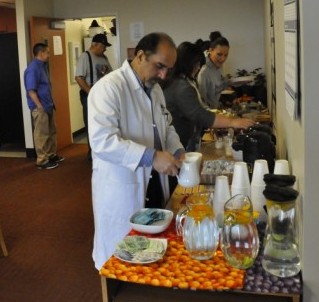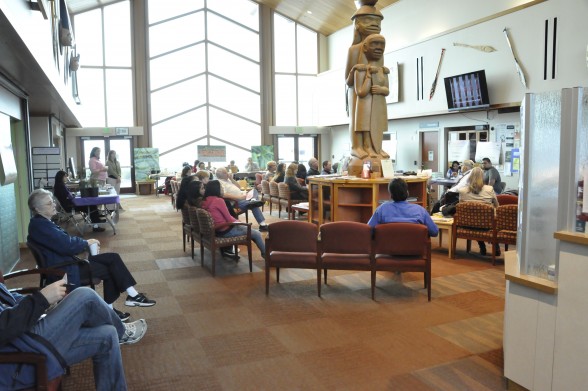
By Kyle Taylor Lucas, Tulalip News guest writer
Tulalip veteran Wes Charles, Jr., was born July 4, 1942 at the “Old Indian Hospital” off Star Route at Tulalip. “A Native American born on the 4th of July! You can’t get more American than that,” exclaimed Wes. It is his common retort to the gleeful responses elicited by those who learn his birth date.
His father was Wes Charles, Sr., a Snoqualmie Indian of the Tulalip Tribes and his mother is Helen Wise Singson, a Native of Nanaimo and NitiNat First Nations, B.C., Canada.
Wes’s maternal grandfather was Bill Wise, Sr., a Chief of the Nanaimo Band, B.C., Canada. His dear grandmother, Hazel Wise, was NitiNat of Vancouver Island, B.C. “They were a blessing in my life,” said Wes.
“Being an urban Indian and raised here in the city [Seattle], my one great regret is that I didn’t get to know my people at Tulalip. I have relatives at Tulalip, some I don’t know and I feel truly sorry and ashamed for not knowing them,” said Wes.
Of his Tulalip family, Wes has two half-sisters, Audrey and Diane Charles. “They live on the Tulalip reservation and I wish that I saw them more” His father, Wes Charles, Sr., has passed, as have his two uncles, Leo P. Charles and Joseph Charles, Jr.
Wes is grateful to have kept in touch with his Tulalip cousin Don (Penoke) Hatch whose generosity and habit of doing good without accolade he praised.
A second regret among the few of his life is not receiving his Indian name. “It is one sad aspect of urban living away from the people and culture of the reservation,” said Wes.
He spent much time with his grandparents at Nanaimo. His Nanaimo Indian Band has a family Sacred Mask dance and song, “SkweSkwe” that has been in his family for generations.
Of his Nanaimo, NitiNat, and Filipino family, Wes has three half-brothers, Marvin “Bunny” Singson who lives at Hoodsport, Sonny “Marciano” Singson who lives in Lacey, Mike “Butch” Singson who lived on the east coast but passed from cancer, and two half-sisters, Marilyn “Lynn” Singson who lives with his mother, Helen Singson, 90, in Renton, and Marian “Snookie” Singson who also passed from cancer
Wes said his has been a full life. “Like most Indian families, in my childhood, I experienced issues with family alcoholism, but my life was mostly good. I don’t like to think about the negative.” He was raised in Seattle and graduated from Garfield high school in 1960.
Wes was raised by his mother and his stepfather, Marciano Vincent Singson, a Filipino American who loved Wes and who taught him to cook specialty Filipino dishes loved by his family. “Dad raised six kids and worked with Great Northern on the railroad,” said Wes, adding that his family in B.C. was very fond of him.
Marine Corps Military Service
Wes served eight years in the Marine Corps where he traveled all around the world, Japan, Korea, Hong Kong, Vietnam, Philippines, Mexico and many U.S. states, Hawaii, Florida, North Caroline, and Guam

In Chu Lai, a seaport in Nui Thanh district, Quang Nam province, Vietnam, Wes made five major operations, engaged with the enemy. “Chu Lai was all scrub pine. We were guarding the Seabees and made an airstrip for jets to land.”
Preparing to return from Vietnam in 1967, Wes was asked to choose three possible discharge stations in preferred order. Wanting to discharge close to home, he chose Sand Point, Bangor, and Camp Pendleton in that order. Instead sent to Marine Corps Base Camp LeJeune, a 246-square-mile United States military training facility in Jacksonville, North Carolina, later determined to be a toxic site. Wes was honorably discharged from Camp LeJeune after a year of final service, leaving the Marine Corps with the rank of Sergeant E5.
“Vietnam changed everything in my life. It took a long time to adjust after I returned. Night was my best friend. I was afraid to go to sleep, so I took long walks and sat in the park and reflected,” said Wes. “For a long time, I slept with a knife under the pillow and a pistol nearby.” He had gone to Vietnam with 125 men. Only 22 of them returned. For years, he was haunted by survivor guilt and the question, “Why did I come back, and not all those guys?”
Answers came unexpectedly in his recent viewing of a documentary film. A Sioux veteran with long gray hair related his return from Vietnam and ensuing years of depression, drug and alcohol abuse, and terrible nightmares. He then went to a sweat lodge purification ceremony and talked to an elder.
Wes was surprised when the Sioux veteran asked the same questions haunting him since Vietnam, “Why did I not get hit? Why did I come home and not them?” The elder replied, “You did get hit, but the bullets passed through you because the Creator had other things in store for you.” After 44 years, these words comforted. He could finally reconcile having been spared and accept that while he was not hit, he had his wounds, and that Creator had other things in store for his life. “I hope I’ve achieved my life purpose,” said Wes.
Another striking revelation from the documentary was that, due to stereotypes, other Native veterans had been required to serve as point man on military operations. This was often the case during Wes’s Vietnam experience. There was a stereotypical assumption that Indians have some innate gifts as guides. Of course, serving as point man also meant greater risk to life or limb.
Wes acknowledges discrimination in the Marine Corps. At the same time, “Throughout my military and law enforcement career, I saw a lot of prejudice against all colors. I saw people hungry for power. I saw people efficient at their jobs. I saw people in high places that are just collecting a check.”
In his ensuing law enforcement career, Wes was often approached for advice and support by veterans from various military branches “who had seen heavy fighting in Nam.” He noted, “It was something I did gladly. It worked both ways; it was a healing process for them and me.”
Asked about service-related health issues, Wes said he was exposed to Agent Orange in Vietnam. “A lot of guys had a lot of diseases, lupus, cancer, arthritis, and rashes. I can’t go out into sun or I get a rash.”
Eldest son William James Charles (BJ), now age 37, had always wanted to join the service and enlisted in the Marines early in the Iraq occupation. He wanted to go to Iraq, but was instead sent to Military Occupational Service in Florida. “He made Private First Class right out of boot camp,” Wes proudly declared.
Ironically, Wes’s younger son, Nicholas Ryan Charles (Nick), now age 34, didn’t want to go to war, but joined the Marines in order to be with his brother, yet he was sent to Iraq where he sustained a perforated ear drum from an IED. “Nick made Honor Platoon out of boot camp,” said Wes.
Wes appreciated that the Tulalip Tribes invited his sons and him to have their portraits, as veterans, included at the administration building and the Hibulb Cultural Center.
His dad, Wes Charles, Sr., was also a veteran and had served in the Army Airborne in World War II. He was in many different campaigns and ultimately lost his toes during war. Wes’s uncle, Joe Charles, was killed in Korea. Brothers Marvin and Mike Singson also served, but they were in the Air Force.
Wes had joined the service with three buddies going back to junior high school. A best part of his service is that the four returned and have remained lifelong friends. Kal lives on Capitol Hill and calls Wes every Fourth of July on his birthday. Ed moved to Hawaii and they still keep in touch. His third buddy, Pete, is also his cousin and he lives on Bainbridge Island.
“The Love of My Life”
After returning from Vietnam, a friend introduced Wes to Laurie who would become his bride. Laurie was a beautiful woman of Norwegian, German, and Irish descent. He offered her a ride in his brand new 1966 GTO. “It was loaded,” said Wes. He put the top down and took her on a cruise around Lake Washington, but ended up with a ticket for excessive lane change. Laurie felt badly, but he assured her “it was worth it just being with you,” and they started dating.
Wes and Laurie married two years later in 1969. They were married for the next 44 years. “She was the love of my life,” said Wes, pointing to a portrait of the young Laurie. He spoke of their happy years together, of their symbiotic sense of humor, and shared photo albums and walls of portraits reflecting their happy life.
Wes lost his beloved Laurie to brain cancer on January 1, 2011. “She had breast cancer resulting in double mastectomy, which spread to her lymph nodes and other organs, but they didn’t realize it had spread to her brain.” They made at least 180 trips to the hospital during that time, sometimes going to three appointments in one day, for blood work, radiation, chemotherapy, blood transfusions, and labs.
To preserve her dignity, Wes refused caregiver services. He took care of her bathing, toilet needs, dressing, and the household duties. “She was more comfortable with me doing it,” said Wes. “Thankfully, I had recently retired from King County, so I was able to care for her full-time and had excellent health care benefits.”
Wes described Laurie’s generosity and her charitable work. She was committed to the work of Doctors without Borders and supported the American Cancer Society, the USO and Disabled American Veterans, local food banks, Food Lifeline, and countless poverty organizations. Wes pointed to a tablet listing 25 or more organizations and annual donation amounts of $50 to $100 each, contributions that he continues in her honor.
Wes’s life, today, is filled with cherished memories of his life with Laurie, of raising their two sons together, and now seeing his son’s establish their own lives. While he points to a life well lived, he admits that it was not without challenges.
Adding to the issues associated with Vietnam, like some in his family and many in Native communities, Wes started a pattern of problem drinking established in his service years. “You’re not a Marine unless you drink boos and it was cheap in the military. But when my first son was born, I told Laurie that I was going to quit. She was surprised and asked if I could do it on my own. I said I could and I did. That was 37 years ago and I haven’t touched a drink since! My word is my bond.”
Distinguished Law Enforcement Career
Wes began a 37-year career at the Seattle Police Department jail where he served for four years as a special police officer. A sergeant inquired whether he could handle a gun and whether he had served in the military, and then urged Wes to apply for a newly created position of Court Detail Officer. Wes was hired as one of the original group that received special training to handle high-security prisoners.
When King County and the Seattle City Council merged jails to save money, his job became a part of King County Adult Detention. It was the largest jail in the northwest, housing as many as some prisons. “It was a dangerous time in the late seventies when there was a lot of gang activity,” said Wes.
Wes said, “I’ve seen a lot of Natives come through jail. In the seventies, with local laws such as Drunk in Public (DIP) or Urinating in Public (UIP), I saw a lot of Indians being arrested.” He sometimes saw 98 bookings in those days, many of them Natives. Asked whether DIP and UIP actually helped alcoholics on the street, he replied, “Yes. It allowed “Three squares and a flop.” It allowed many to come in and dry out in a safe environment, to get three square meals and a chance to sleep in a cell where it was safe. “It was important to those Indians who would be targeted when they received their checks, especially the Indian kids who were often brought into jail after having been beaten up. They were safe to sleep.” Then, Wes realized the bookings had dropped off. Due to alcoholism’s classification as a medical issue, the state determined the DIP law violated the rights of the accused. “A lot of alcoholics disappeared after it was no longer a crime. We stopped seeing them at all.” Asked where they had gone, Wes surmised it was to the detox center, but it worried him..
In the late seventies, conflict occurred when prisons became over-crowded. The Washington Correction Center in Shelton announced it wouldn’t take any more prisoners. The King County jail backed up and something had to be done with over-crowding affecting the prisoner’s demeanor, well-being, and the safety of the officers.
Finally, a King County Superior Court judge ruled that the Washington Correction Center at Shelton had to accept convicted felons sentenced to prison.
Wes was put in charge a special detail transporting 75 prisoners in three (3) busses to Shelton. He appointed officers in charge of each bus and notified all law enforcement agencies between Seattle and Shelton of their plans. The officers had shot guns and Wes had a machine gun. To Wes’s surprise, the Chief arrived in a news helicopter, and after a status report thanked him and the men for a job well done. Wes received a nice letter of commendation, one of m any he would receive over the years.
After superiors nudged him, Wes took the sergeant’s examination. “I was competing against college educated applicants, but I had my Marine Corps training.” He took written and oral tests and scored just above average on the written examination, but scored first place on the oral board over nearly 90 applicants. He was promoted to sergeant and served for five to six years, then took the lieutenant’s test repeating the same test results. After serving for about six years as lieutenant, he was then promoted to captain and served in that role for the next 20 years.
Throughout his career, Wes processed many high-profile prisoners and addressed significant incidents. In 1984, Wes was taken hostage at jail by a prisoner who later admitted he planned to kill his parents. Five to six years into the incident, with SWAT on the roof and unable to access the prisoner, it was decided that Wes would take the prisoner down. He had a gun held to his head twice during the incident. Ultimately, Wes overpowered the prisoner and took him back into custody.
At the 1999 WTO, he said, “rabble-rousers came up from Oregon and the jail coordinated with Seattle Police Department.” His shift booked over 600 prisoners.
As an artist, Wes’s design skills were sought on several occasions. When an honor guard was created, he helped design the uniform in likeness to the Marine Corps uniform. He also helped draw and design the patches on the jail uniforms.
Commenting on what success such as his required, Wes said, “A lot of it is attitude and preparation. I took the basics, first aid, CPR, weapons, and any extra management training I could.” He also volunteered for the worst shift, graveyard, because it provided him the best experience. “Time passed quickly and I wasn’t afraid of the responsibility. Most importantly, said Wes, “In order to be a good leader, you have to be able to listen to people.” He had 75-80 officers on a shift. “I worked for 37 years in the jail and could easily have done 40 because I loved it so much.”
In 2000, Wes received a letter from King County stating he had been nominated for the Medal of Valor. The second highest award of the department, it was a unanimous nomination. Wes was the only captain to receive the Medal of Valor. “Throughout my military service and law enforcement career, I had to prove myself over and over and over again. This said I handled myself pretty good,” said Wes who served as a Captain for over 20 years.
A Life of Purpose

Wes is a gifted artist who draws and sketches in pencil and colored pencil. He “I’m thinking about doing some more carving,” said Wes, adding, “I did a little carving when I was younger and carved a few pieces, including an owl for Laurie.” Though humble, Wes is also a gifted photographer, capturing spectacular shots of nature, flowers, and scenery from his lovely home perched high atop the hill in West Seattle with expansive views of the cityscape and mountain. Daily walks to the park with his dog, Gus, provide endless opportunity to capture “Mother Earth’s bounty” as Wes put it. His son and daughter-in-law were so impressed with his photography that they had a collection of his remarkable photos captured in a bound book.
Also for fun, Wes occasionally makes the trip north to the Tulalip casino, proudly stating it is the only one he’ll visit.
Wes’s eyes light up as he announces that his son Nick and daughter-in-law Kim are expecting their first child and his first grandchild. In a recent conversation, he excitedly reported, “They just called to say I am going to be a grandfather and it’s a girl! She will be named Isabella Laurie Kathryn Charles and will be born near the end of June.” Wes happily tells of Nick and Kim’s marriage in a traditional Korean ceremony last year, adding, “It was very special and beautiful.”
Asked whether he ever considered relocation to the reservation, Wes said it was not an option, adding, “A lot of urban Indians don’t live at the rez because there’s just no housing. Also, I had my career at King County and the commute with a young family was not a possibility.”
“Besides my children being born, Laurie, and law enforcement and the Marine Corps were highlights of my life. As I look back, I hope I have fulfilled my life purpose.”





 Mitchelene BigMan served as a mechanic in the Army. / CBS News
Mitchelene BigMan served as a mechanic in the Army. / CBS News













